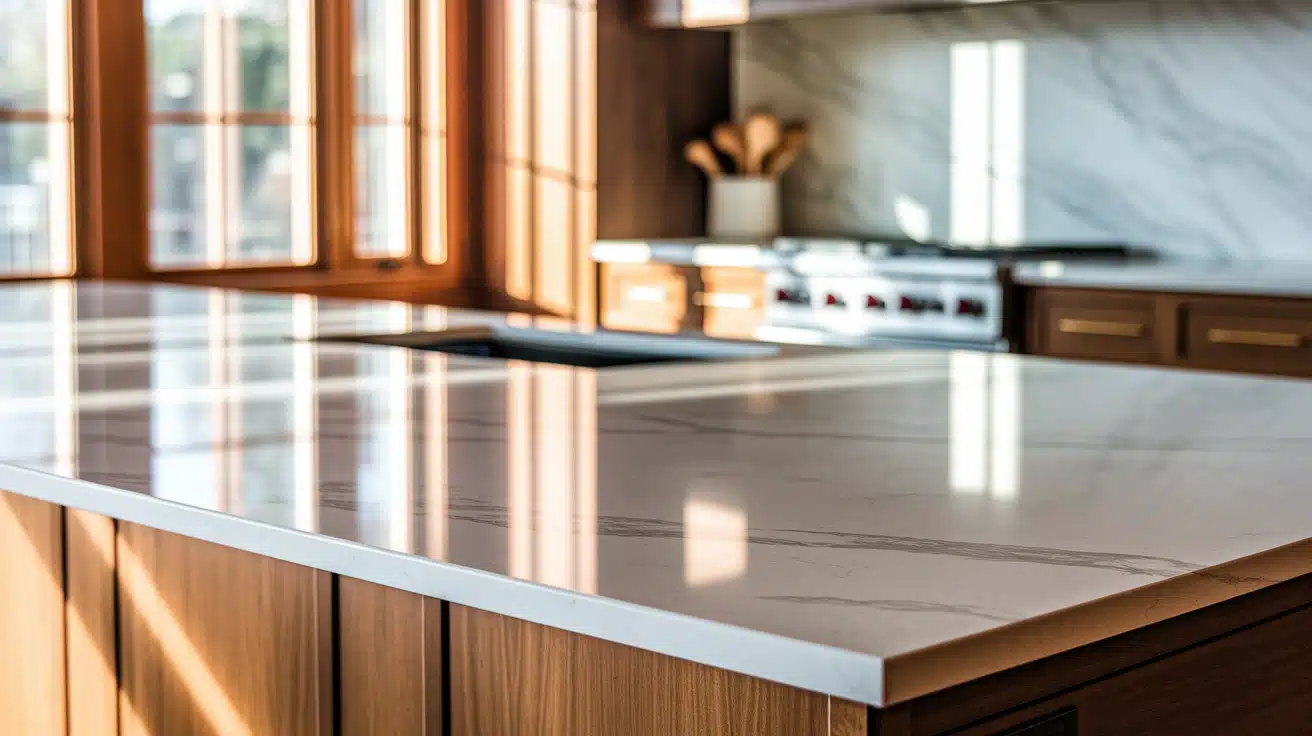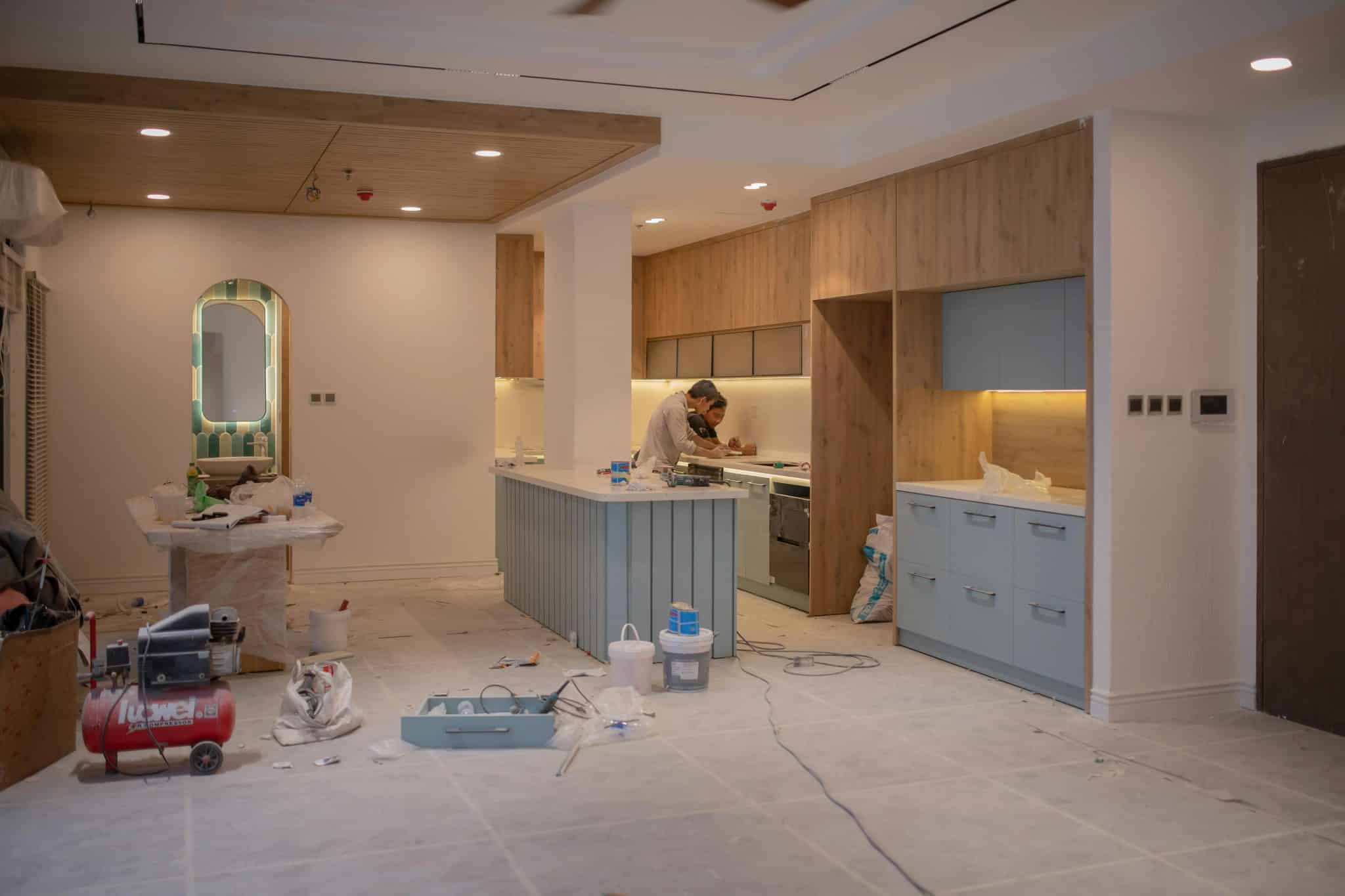Are you considering quartz countertops for your kitchen or bathroom renovation? You’re not alone; quartz has become the most popular choice for countertops in modern homes.
However, with prices ranging from $80 to $170 per square foot, this investment warrants careful consideration.
While quartz offers incredible durability and low maintenance, it also has drawbacks, including heat sensitivity and higher costs. The truth is, quartz isn’t perfect for every homeowner or budget.
This guide breaks down the real pros and cons of quartz countertops, from installation costs to daily care requirements.
By the end, you’ll know exactly whether quartz is a good fit for your lifestyle, budget, and design goals, helping you make a confident decision for your home.
What are Quartz Countertops?
Quartz countertops are engineered stone surfaces composed of 90-95% natural quartz crystals, mixed with polymer resins and pigments. Manufacturers add other minerals, such as glass and metallic flecks, to enhance strength and create unique colors and patterns.
This combination creates a non-porous surface that’s harder than granite, making quartz the top choice for modern kitchens and bathrooms.
Homeowners love that it resembles natural stone but requires almost no upkeep – no sealing is needed, unlike granite or marble, and it naturally resists stains, scratches, and bacteria.
Pros of Quartz Countertops
Quartz countertops offer exceptional durability, low maintenance, a wide range of design options, and a non-porous surface that resists stains and bacteria, making them a great choice for modern kitchens and bathrooms.
1. Durability and Strength
Quartz countertops are extremely tough and built to last for decades. The engineered surface resists scratches from knives, chips from dropped items, and stains from spills.
This makes them perfect for busy kitchens and high-traffic bathrooms where daily wear and tear is common. You can prep food directly on the surface without worrying about damage.
2. Low Maintenance
Quartz requires almost zero maintenance compared to natural stone options. Unlike granite or marble, it never needs sealing treatments or special care routines.
Simple daily cleaning with soap and water keeps it looking brand new. The non-porous surface naturally resists bacterial growth, making it a hygienic choice for food preparation areas.
3. Wide Range of Designs and Colors
Quartz offers more design options than any other countertop material. You can choose from hundreds of colors, patterns, and finishes to perfectly match your style.
From solid colors to marble-look veining, there’s a quartz design for every taste. This variety makes it easy to complement both modern and traditional home designs.
4. Non-Porous Surface
The engineered surface of quartz completely blocks liquids from soaking in. Spilled wine, coffee, or cooking oils sit on top instead of seeping into the material.
This means no permanent stains or odors can develop over time. You can clean up any mess quickly without stress or special treatments.
5. Eco-Friendly Options
Many quartz brands now include recycled materials in their manufacturing process. These eco-friendly options use recycled glass, mirrors, and other materials to reduce waste.
Choosing recycled-content quartz helps the environment while still getting all the benefits of traditional quartz. This makes it a greener choice than mining new granite or marble.
What are the Negatives of Quartz Countertops?
Quartz countertops offer exceptional durability, low maintenance, a wide range of design options, and a non-porous surface that resists stains and bacteria, making them a great choice for modern kitchens and bathrooms.
1. Higher Initial Cost
Quartz countertops cost significantly more than budget-friendly options like laminate or butcher block. Expect to pay $50-$120 per square foot for materials alone.
Professional installation adds another $30-$50 per square foot to your total project cost. This upfront expense can strain renovation budgets compared to cheaper alternatives.
2. Can Be Damaged by Excessive Heat
Hot pots and pans can cause permanent damage to quartz surfaces. The resin binders can crack, discolor, or create white marks when exposed to high temperatures.
Always use trivets, hot pads, or cooling racks to protect your investment. Even brief contact with very hot items can leave lasting damage that’s expensive to repair.
3. Heavy Material
Quartz slabs are extremely dense and heavy, weighing up to 25 pounds per square foot. This weight requires professional installation with proper cabinet reinforcement and specialized equipment.
DIY installation is nearly impossible without risking injury or damage. Most cabinets need additional support brackets to handle the extra weight safely.
4. Limited Natural Look
Quartz patterns can look manufactured compared to the unique beauty of natural stone. While technology has improved, many quartz designs still show repetitive patterns that lack natural randomness.
Granite and marble offer one-of-a-kind veining and color variations that quartz cannot fully replicate. Some homeowners prefer the authentic imperfections found only in natural materials.
5. Susceptible to Scratches on the Surface
Sharp knives and metal objects can scratch quartz despite its durability claims. While resistant to normal wear, the surface can show visible scratches from direct cutting or sliding heavy appliances.
These surface scratches are difficult and expensive to repair professionally. Always use cutting boards and protective pads to prevent permanent damage to your countertops.
How to Care for Quartz Countertops
Caring for quartz countertops is simple and requires minimal effort to maintain their appearance. Clean daily with warm water and mild dish soap using a soft cloth or microfiber towel. Avoid harsh chemicals, such as bleach or abrasive cleaners, as they can dull the surface.
To prevent damage, always use cutting boards when chopping food and place trivets or hot pads under hot pots and pans to protect against heat damage.
Regular wiping and these basic precautions will keep your quartz countertops beautiful for years without any special treatments or sealing.
Quartz vs. Other Countertop Materials
Quartz offers superior durability, low maintenance, and a wide range of designs compared to materials like granite, marble, and laminate, but can be pricier and less heat-resistant than some alternatives.
| Feature | Quartz | Granite | Marble | Laminate |
|---|---|---|---|---|
| Durability | Very durable, scratch and stain-resistant | Durable, may chip or crack | Prone to scratches and stains | Easily scratched and burned |
| Maintenance | Low maintenance, no sealing | Needs sealing and regular care | Requires sealing, sensitive to acids | Easy to clean, no sealing |
| Appearance | Variety of colors, modern look | Natural variations, classic style | Elegant with natural veining | Limited designs, less premium |
| Price | $80 to $170 per sq ft | $40-$200 per sq ft | $50-$150 per sq ft | $10-$40 per sq ft |
| Ease of Care | Easy to clean, non-porous | Needs sealing, more upkeep | Requires careful cleaning | Very easy to clean, may stain |
| Lifespan | 20+ years with care | 30+ years with care | 20-25 years with care | 10-20 years, depending on wear |
Also, read our complete guide on Quartz vs Silestone: Which Countertop Is Right for You?
Final Thoughts
Quartz countertops offer impressive durability and low maintenance, but they come with higher costs and some limitations.
The benefits are clear: scratch resistance, stain protection, easy cleaning, and a consistent appearance that adds value to your home.
However, the drawbacks include a significant upfront investment, heat sensitivity, and a lack of natural stone character, which some homeowners prefer.
The decision ultimately comes down to your priorities if you value convenience and modern looks over budget concerns, quartz delivers excellent long-term value. For busy families who want beautiful countertops without ongoing maintenance, quartz is hard to beat.
Ready to install quartz countertops in your home? Contact us today for a free consultation and personalized quote.
Frequently Asked Questions
Which Is Better, Granite or Quartz?
Quartz is better for low maintenance, while granite is preferred for its natural beauty.
Does White Quartz Turn Yellow?
Yes, from sunlight and heat exposure over time.
What Are the Don’ts for Quartz Countertops?
Avoid using hot pots, harsh chemicals, or cutting directly on the surface.











